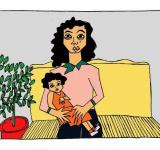From Left Behind to Staying Back: Changing How We Think About Children in Migrant Households
Migration has a significant impact on children, whether they accompany their parents or remain at home. The term "left behind children" frequently refers to individuals who stay in their home nation while their parents travel overseas or within. This discussion paper, based on research from the Migration for Development and Equality (MIDEQ) Hub, criticizes the phrase, claiming it implies abandonment and passive suffering. Instead, it argues that migration in the Global South is a household livelihood plan in which children actively participate and benefit. By reviewing case studies from Burkina Faso, Egypt, Ethiopia, and Nepal, the report argues that the word "stay back" better reflects the realities of these children. It closes with policy considerations for minimizing childhood inequities in migration circumstances.


